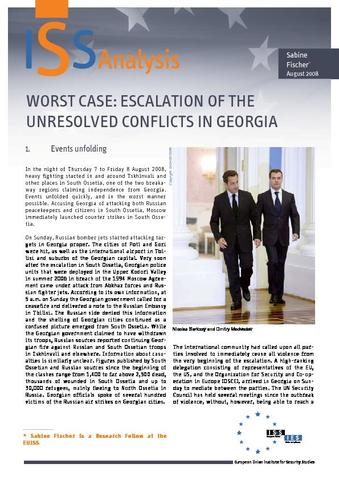You are here
Worst case: escalation of the unresolved conflict in Georgia

In the night from Thursday, 7 August 2008, to Friday, 8 August 2008 heavy fire fighting started in and around Tskhinvali and other places in South Ossetia, one of the two breakaway regions claiming independence from Georgia. Events unfolded quickly afterwards, and in the worst manner possible. Accusing Georgia of attacking both Russian peacekeepers and citizens in South Ossetia, Moscow launched counter strikes in South Ossetia immediately. On Sunday, Russian bomber jets started attacking against targets in Georgia proper. The cities of Poti and Gori have been hit, as has been the international airport in Tbilisi and suburbs of the Georgian capital. Very soon after the escalation in South Ossetia, Georgian police units deployed in the Upper Kodori Valley in summer 2006 in breach of the 1994 Moscow Agreement came under attack from Abkhaz forces and Russian fighter jets. On Sunday, 10 August, 5 a.m., the Georgian government according to its own information called for a ceasefire and delivered a note to the Russian Embassy in Tbilisi.
The Russian side denied this information, the shelling of Georgian cities continued while ambivalent information emerged from South Ossetia. While the Georgian government claimed to have withdrawn its troops, Russian sources reported Georgian continued fire against Russian and South Ossetian troops in Tskhinvali and other places. Information about casualties is ambivalent as well. Figures published by South Ossetian and Russian sources since the beginning of the clashes range from 1400 to far above 2500 dead, thousands of wounded in South Ossetia and up to 30000 refugees, mainly fleeing to North Ossetia in Russia. Georgian officials spoke of several hundred victims of the Russian air strikes on Georgian cities.
The international community had called upon all parties involved to immediately cease all violence from the very beginning of the escalation. A high ranking delegation consisting of representatives of the EU, the US, and the OSCE, arrived in Georgia on Sunday to mediate between the parties. The UNSC held several meetings since the outbreak of violence, without though being able to reach a common position on the issue. The French Presidency of the European Union has stepped up its efforts to find a solution to the renewed conflict and has announced that it would gather EU meetings on several levels including a snap summit, in the upcoming days. French Foreign Minister Bernard Kouchner went to Tbilisi. Several Western leaders, including Nicolas Sarkozy, George Bush and others, have been in direct contact with Russia’s President Dmitry Medvedev and Prime Minister Vladimir Putin. On Monday, the Georgian side signed a ceasefire deal proposed by Bernard Kouchner and other European diplomats. Upon the visit of President Sarkozy to Moscow on Monday, President Medvedev put an end to further military operations, although the decision seems to be dependent on Georgia signing a formal commitment not to use force against Abkhazia and South Ossetia...